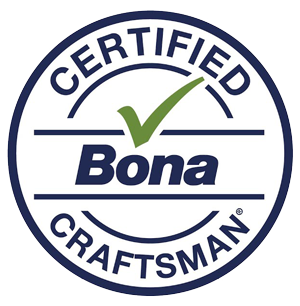Table of Contents
How to Choose the Right Hardwood Floor Cleaner
Hardwood floors are an investment that demands proper care to maintain their natural beauty and durability. Choosing the right cleaner is essential to preserving the finish, preventing damage, and extending the lifespan of your flooring. Homeowners and businesses in the Northwest Suburbs of Chicago, as well as those who value custom hardwood work, know that the cleaning method and ingredients can greatly affect a floor’s appearance and performance. With decades of experience in custom installation, refinishing, and repair, experts agree that every type of hardwood—from oak to maple to exotic species—requires a tailored cleaning approach. This article explains the differences in flooring types, outlines key ingredients to look for or avoid, and details the best cleaning methods and maintenance schedules to keep your hardwood floors pristine.
In the following sections, we address common questions, provide comparisons, and offer troubleshooting advice. By understanding the specific needs of different hardwood types and the science behind cleaning products, you can protect your flooring investment while maintaining a professional, environmentally friendly routine that uses tools like microfiber mops, swiffer-like systems, and non-abrasive brushes.
What Types of Hardwood Floors Require Different Cleaners?
Hardwood floors are not one-size-fits-all; their finishes, textures, and construction methods demand unique cleaning regimens. Floors can generally be grouped into solid, engineered, and exotic hardwood. Their characteristics affect not only visual appeal but also vulnerability to cleaning agents. Factors such as water resistance, adhesive properties, and environmental concerns are critical when choosing a cleaner. An unsuitable chemical or tool may damage the protective coating, saturate the wood, or strip away layers of finish. The following sections explain how floor composition—from natural oak grains to engineered composites—affects cleaner selection.
Which Hardwood Floor Types Need Special Cleaning Care?
Solid hardwood, cut from a single piece of timber, requires gentle care. Changes in humidity and temperature can cause expansion and contraction, potentially leading to warping if too much water is used. A pH-neutral, water-based cleaner is ideal for protecting the finish without stripping it.
Engineered hardwood features a real wood veneer bonded to layers of plywood or fiberboard. The adhesives used are sensitive to high moisture and harsh chemicals; thus, only mild cleaners should be used to avoid delamination.
Exotic hardwood floors, made from dense, unique wood species like Brazilian cherry, walnut, or teak, need cleaners that respect their rich natural oils and delicate finish. A cleaner that enhances natural luster without compromising inherent properties is preferred.
Matching the cleaner to the specific wood type—whether solid, engineered, or exotic—is key to ensuring high performance and long-term protection.
How Do Solid, Engineered, and Exotic Hardwood Floors Differ in Cleaning Needs?
Solid hardwood reacts strongly to moisture, expanding and contracting throughout the cleaning process. Mild, water-dispersed solutions free of harsh chemicals are best to prevent warping. Engineered floors, with their layered construction, require cleaners that evaporate quickly to avoid damaging sensitive adhesives. Exotic floors, noted for their unique grain and color, are even more sensitive. Over-cleaning or use of the wrong product can diminish their natural sheen. Understanding these differences helps you select not only the right cleaning agent but also the proper tools and methods for maintaining an elegant appearance with minimal water exposure and reduced risk of water damage.
What Are the Best Cleaners for Oak, Maple, and Other Common Hardwoods?
For hardwood types such as oak and maple, industry experts recommend pH-neutral cleaners. These safe solutions help maintain the wood’s natural oils while removing dust and debris effectively. Increasingly, plant-based cleaning solutions are favored for their eco-friendly profile and gentle performance on wood surfaces. Commercial products like EcoShine Floors use biodegradable ingredients that deliver a streak-free finish. Conventional cleaners might contain ammonia or synthetic detergents, which can be effective in cutting through soil but may eventually damage the wood finish if used frequently. A microfiber mop with a spray bottle or misting attachment ensures that just the right amount of liquid is applied, minimizing moisture exposure while dissolving soil and debris like dust, oil, and even stubborn stains.
What Key Ingredients Should You Look for in Hardwood Floor Cleaners?
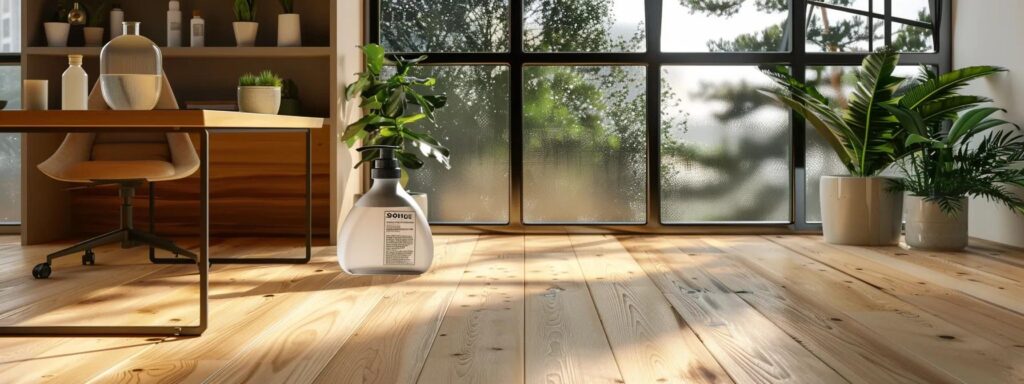
The composition of a hardwood floor cleaner is critical. Look for pH-neutral agents, plant-based surfactants, and a balanced mix of water with essential oils. These ingredients work together to gently lift debris and soil (including dust, oil, and citrus-based residues) without triggering chemical reactions that could degrade the wood finish.
Why Are pH-neutral and Plant-Based Ingredients Important?
pH-neutral cleaners maintain the natural acid-base balance of wood—a pH range between 6.5 and 7.5—which helps prevent finish erosion. Plant-based ingredients derived from renewable sources such as citrus or corn offer effective cleaning without the toxicity associated with traditional chemicals. In addition to protecting wood integrity, these eco-friendly compounds safeguard indoor air quality and reduce the need for abrasive cleaning methods. This is especially important in environments where techniques involve tools like gentle brooms, microfiber towels, and non-abrasive brushes.
How Do Eco-Friendly Ingredients Protect Your Hardwood Floors and the Environment?
Eco-friendly cleaners use low-VOC, biodegradable ingredients that minimize impact on both wood and the environment. Free from harsh chemicals such as ammonia, acids, or synthetic solvents, these products gently remove soil while preserving the adhesive properties of the wood’s finish. By using reclaimed citrus extracts and non-toxic surfactants, these solutions maintain a balanced pH that protects against moisture damage. As indoor air quality and sustainability become increasingly important for consumers, eco-friendly products also help reduce potential chemical residues, safeguarding both home environments and the long-term beauty of hardwood floors.
What Certifications and Standards Indicate a Safe Hardwood Floor Cleaner?
Certifications like EPA Safer Choice, EcoLogo, GREENGUARD, and ISO standards are reliable indicators that a cleaner meets stringent environmental and health requirements. Products bearing these certifications have been independently tested to ensure low chemical emissions and sustained cleaning efficacy, providing added assurance that the cleaner will protect your hardwood floor while supporting responsible, sustainable practices.
Which Ingredients Should You Avoid When Choosing Hardwood Floor Cleaners?
Not only should you seek beneficial ingredients, but you also need to avoid those that can harm hardwood floors. Certain chemicals, although effective at removing grease or soil, can ultimately damage the protective finish of your wood.
Why Are Harsh Chemicals and Ammonia Harmful to Hardwood Floors?
Harsh chemicals such as ammonia or bleach are known to strip away the floor’s protective top layer, causing scuffs, discoloration, and even cracks. Ammonia’s strong alkaline nature can disturb the wood’s pH balance and make it more vulnerable to water damage. Over time, repeated exposure to such substances accelerates aging and may necessitate expensive refinishing or replacement.
Can Vinegar or All-Purpose Cleaners Damage Hardwood Floors?
Though vinegar is a popular natural cleaner, its high acidity can lower the floor’s pH to damaging levels, weakening the finish and causing etching. All-purpose cleaners not designed for hardwood may include a mix of aggressive chemicals that build up on the wood surface, reducing its natural shine and eventually damaging the fibers. It is best to use cleaners specifically formulated for hardwood floors to avoid these long-term effects.
What Are the Long-Term Effects of Using Unsuitable Cleaning Products?
Over time, unsuitable cleaners can cause the wood’s natural color to fade, introduce micro-scratches, and degrade the finish. This can also reduce the floor’s resistance to moisture, leading to warping or discoloration. Repeated use of harsh chemicals may force homeowners into more frequent refinishing cycles, ultimately diminishing both the visual appeal and durability of the floor.
What Are the Best Cleaning Methods and Tools for Hardwood Floors?
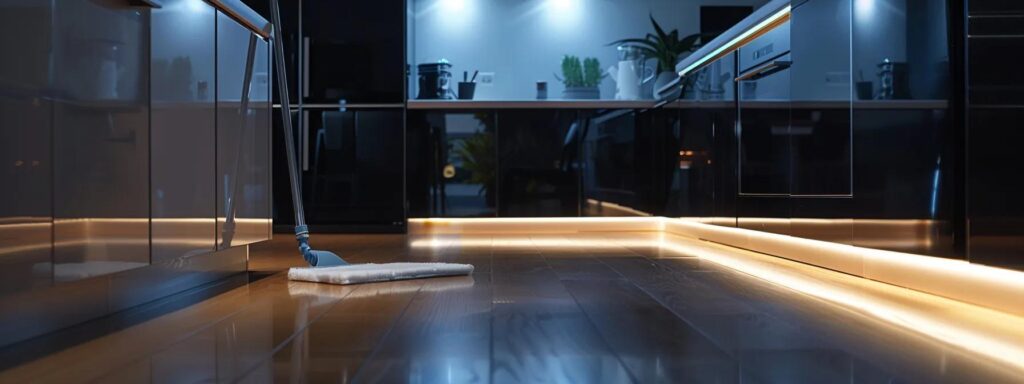
Choosing the right cleaning solution is only part of the equation; effective cleaning methods and tools are equally important. Whether you use a microfiber mop, a gentle vacuum with a soft-bristle attachment, or even a non-abrasive brush, every tool must be selected to avoid damaging the surface while efficiently removing debris like dust, soil, and oil.
How Often Should You Clean Hardwood Floors for Optimal Maintenance?
Routine cleaning is key to preserving hardwood floors. A daily dry mop or sweep can remove dust and prevent scratching, while a weekly damp cleaning with a properly diluted pH-neutral cleaner tackles deeper grime. For high-traffic areas or homes with pets, bi-weekly wet cleaning might be necessary. Supplementing regular cleaning with a professional deep clean every 6 to 12 months helps restore natural luster and prevents long-term damage.
Which Tools Work Best: Mops, Vacuums, or Microfiber Cloths?
Non-abrasive tools are crucial for hardwood care. A vacuum with a soft brush attachment efficiently removes dust from seams without scratching sensitive surfaces. Microfiber mops and cloths trap particles effectively, while limiting moisture use to avoid water damage. In some cases, electric polishers or gentle buffers may be appropriate but should only be used when recommended by a flooring expert to prevent over-abrasion.
How to Clean Hardwood Floors Without Streaks or Damage?
For a streak-free shine without damaging your hardwood floor, dilute your cleaner as directed and use a microfiber mop that is only slightly damp. Employ circular motions and gentle lifting to distribute the cleaner evenly while minimizing excess liquid. Immediately drying the floor with a clean microfiber cloth further prevents water marks, ensuring a polished and protected surface. Avoid using high-moisture tools like steam mops, which can impair the wood’s finish over time.
How Do Eco-Friendly Hardwood Floor Cleaners Compare to Traditional Products?
Eco-friendly hardwood cleaners have become popular as more homeowners and professionals prioritize non-toxic, sustainable solutions. Traditional products often rely on harsh chemicals that may damage finishes, whereas eco-friendly alternatives use plant-based, biodegradable ingredients. These environmentally friendly cleaners not only leave floors looking immaculate but also improve indoor air quality by reducing volatile organic compounds (VOCs) and harmful residues.
What Are the Benefits of Using EcoShine Floors’ Plant-Based Cleaners?
EcoShine Floors’ plant-based formulations focus on gentle yet effective cleaning. Their pH-neutral formulas help preserve natural oils and the wood finish while reducing water exposure. Consumers note that these cleaners remove dirt and debris efficiently without leaving streaks or residues. Additionally, sustainable ingredients mean minimal environmental impact, making them a trusted choice for those seeking both performance and eco-friendly practices.
How Do EcoShine Products Perform Compared to Bona, Rejuvenate, and Other Brands?
Compared to established brands like Bona and Rejuvenate, EcoShine products stand out for their environmental credentials and effective performance. While Bona and Rejuvenate sometimes include synthetic additives that may build up over time, EcoShine’s plant-based approach maintains the protective finish longer and often requires lower dosages. This balance of performance and sustainability makes them an attractive option for both consumers and professionals.
What Customer Support and Educational Resources Help You Choose the Right Cleaner?
Many eco-friendly brands, including EcoShine, offer extensive customer support and educational resources. Detailed manuals, video tutorials, and expert advice help ensure that the product is used correctly. Free consultations and comprehensive FAQs guide consumers in selecting the right cleaner for their specific hardwood type, ensuring that each cleaning session supports both the finish and structural integrity of the floor.
How Can You Troubleshoot Common Hardwood Floor Cleaning Issues?
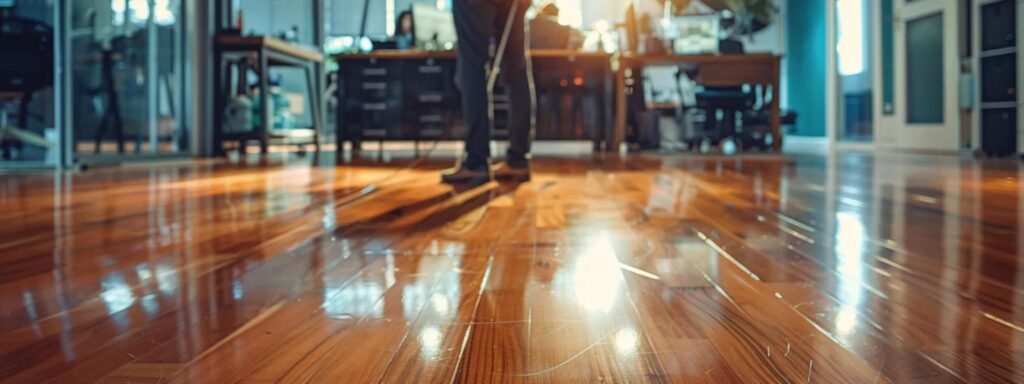
Even with careful cleaning, hardwood floors can develop issues like scratches, stubborn stains, or water damage. Identifying the root cause is crucial before selecting a remedial treatment. The strategies below offer guidance for minor imperfections or more pronounced discoloration while keeping the integrity of the finish intact.
How to Remove Scratches, Dents, and Stains Safely?
For minor scratches and stains, use a soft, damp microfiber cloth with a small amount of pH-neutral cleaner in a gentle rubbing motion. For deeper dents, a carefully applied steam treatment followed by immediate drying may help lift the wood fibers. Alternatively, repair kits with touch-up markers or wax compounds can blend minor scratches with the existing finish. Always test treatments in an inconspicuous area to prevent further damage.
What to Do if Your Hardwood Floor Has Water Damage?
Address water damage immediately by removing standing water and drying the area with soft towels and fans. If the finish is compromised, light sanding may be necessary before refinishing. Preventative measures—such as using moisture barriers under rugs and ensuring cleaning tools are only slightly damp—can help avert future damage. In severe cases, professional intervention may be required to replace affected boards.
How to Handle Discoloration and Stubborn Stains Effectively?
For discoloration and persistent stains, apply a diluted hardwood-safe cleaner and gently scrub with a soft brush. If surface treatments are not enough, a specialized stain remover may be required. In cases of widespread discoloration, deep cleaning followed by professional buffing or refinishing may be the only solution. Always ensure the area is completely dry before any reapplication of finish to prevent further moisture damage.
What Is the Best Maintenance Schedule for Hardwood Floors Using the Right Cleaner?
A consistent maintenance schedule is key to both maintaining the beauty of hardwood floors and extending their life. This schedule should include routine cleaning, periodic deep cleaning, and occasional professional maintenance. Regular care prevents dirt build-up, scratches, and long-term damage, preserving both the aesthetic appeal and structural integrity of the wood.
How to Create a Daily and Weekly Cleaning Routine?
Daily maintenance should involve a soft microfiber dust mop or a vacuum with a hardwood setting to remove loose dust and debris. Weekly, perform a thorough cleaning using a damp mop with a pH-neutral cleaner, taking care not to over-saturate the floor. In busy households—with heavy foot traffic, pets, or high debris—the routine might be adjusted to twice-weekly damp cleaning to prevent accumulation of soil and stains.
When and How Should You Deep Clean or Polish Hardwood Floors?
Plan for a deep clean or polish every 6 to 12 months. Deep cleaning uses specialized wood shampoos that penetrate the finish and remove ingrained dirt, often preceded by light sanding or buffing to remove scuffs. A wood-specific polish can then be applied to restore the floor’s shine. Professional services in the Northwest Suburbs of Chicago can offer customized deep cleaning and refinishing packages tailored to your floor’s needs.
How Does Regular Maintenance Extend the Life of Your Hardwood Floors?
Regular cleaning reduces the accumulation of abrasive particles that could scratch the surface and prevents detrimental residue build-up. Scheduled maintenance also allows for early detection of issues like water damage or significant wear, so that timely interventions can prevent expensive repairs. A proactive maintenance routine not only safeguards the visual appeal but also preserves the structural integrity and overall longevity of your hardwood floors.
Frequently Asked Questions
Q: What is the best type of cleaner for standard oak hardwood floors?
Q: Are eco-friendly hardwood floor cleaners as effective as traditional brands?
Q: How often should hardwood floors be deep cleaned?
Q: What common ingredients should be avoided in hardwood floor cleaners?
Q: Can professional cleaning services significantly extend the lifespan of hardwood floors?
Q: Do hardwood floors need different cleaning tools compared to other floor types?
Q: What are the benefits of creating a regular maintenance schedule for hardwood floors?
Final Thoughts
Hardwood floor cleaning is an investment in the longevity and beauty of your flooring. Regular, careful cleaning using the correct products and methods preserves the finish while preventing long-term damage. By balancing daily upkeep with periodic deep cleaning and selecting the right ingredients and non-abrasive tools—such as microfiber mops, gentle vacuums, and eco-friendly cleaners—homeowners can maintain the natural luster and durability of their hardwood floors year after year. Ultimately, a proactive maintenance schedule not only enhances the aesthetic appeal of your floor but also extends its life, ensuring that your investment remains as beautiful and resilient as the day it was installed.
| Ingredient | Function | Benefit | Related Query |
|---|---|---|---|
| pH-neutral cleansers | Maintain natural wood balance | Prevents finish erosion and preserves shine | Which hardwood floor cleaners to choose? |
| Plant-based surfactants | Dissolve dirt without harsh chemicals | Eco-friendly cleaning with minimal residue | What are safe hardwood floor ingredients? |
| Microfiber mop | Gentle debris removal | Minimizes scratches while cleaning efficiently | Best tools for hardwood floor cleaning |
| Biodegradable solvents | Effective stain removal | Safe for wood aesthetics and indoor air quality | Are eco-friendly cleaners effective? |
| Essential oil-based additives | Enhance natural shine | Restores luster and protects the wood finish | What ingredients improve hardwood floors? |
Regular care through appropriate cleaning methods, the right ingredient selection, and a scheduled maintenance routine is key to protecting your hardwood floors. By following these guidelines, you can confidently choose cleaners that combine effectiveness with safety, preserving the elegant beauty and resilience of your wood surfaces while employing environmentally friendly practices and tools like gentle brushes, non-abrasive mops, and spray bottles for precise application.


